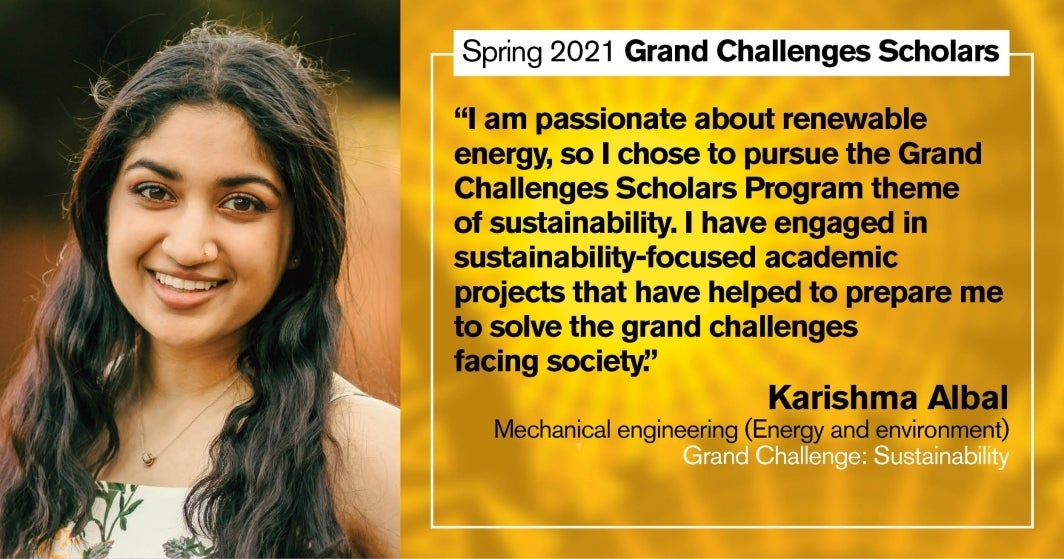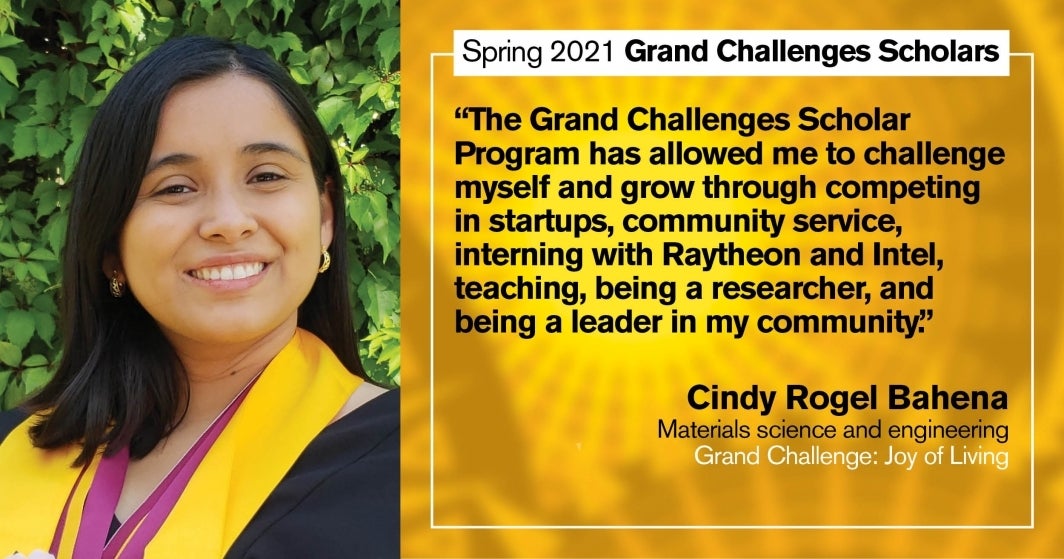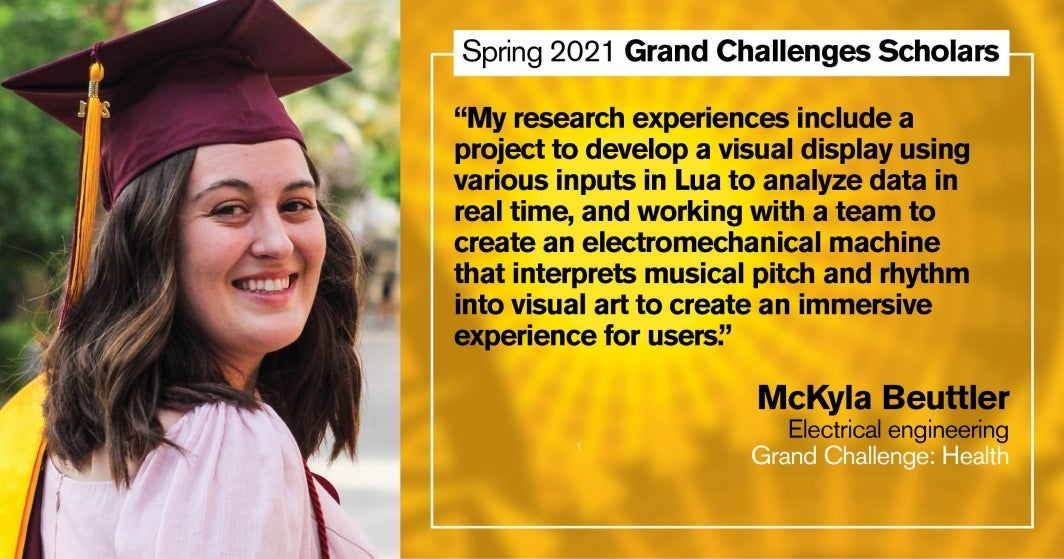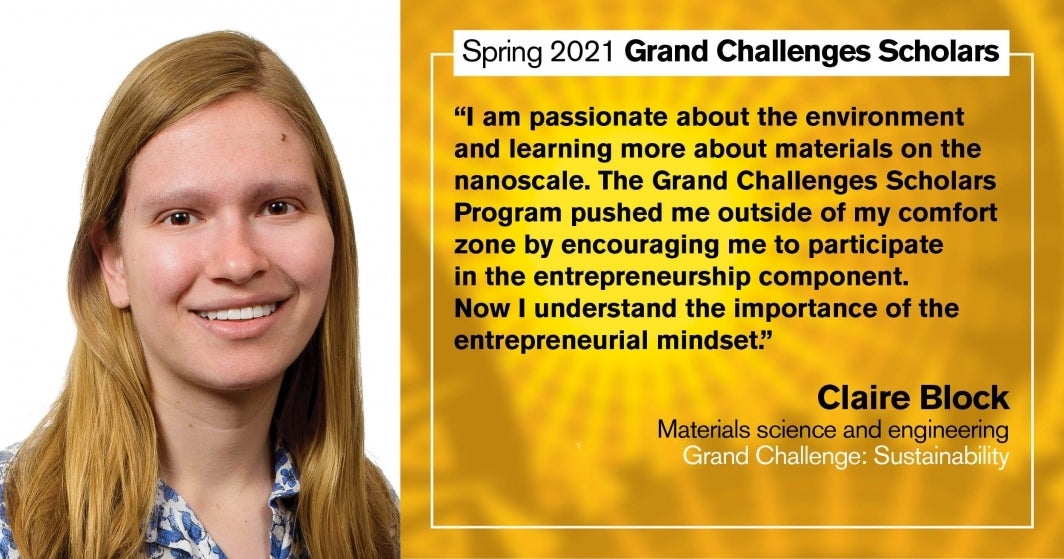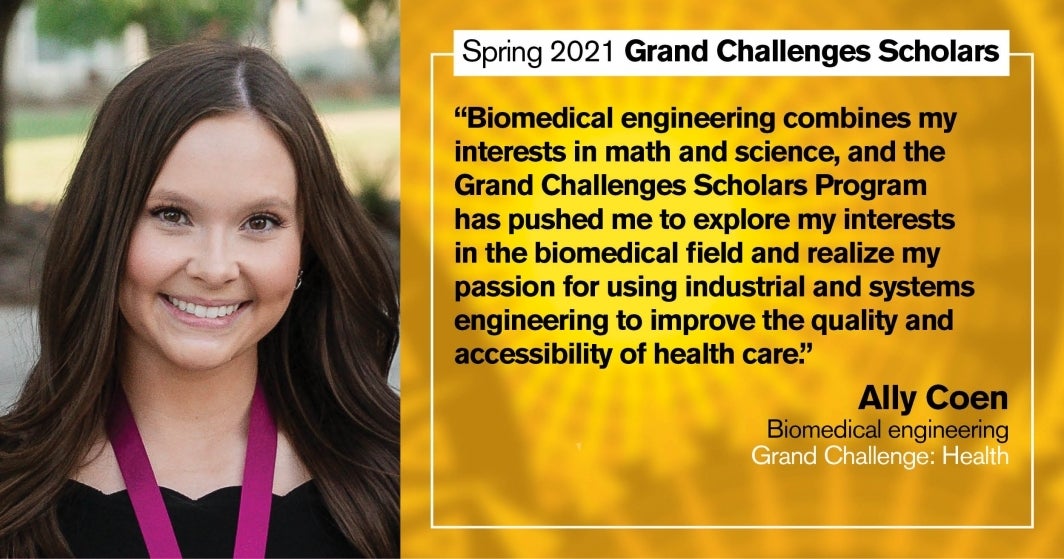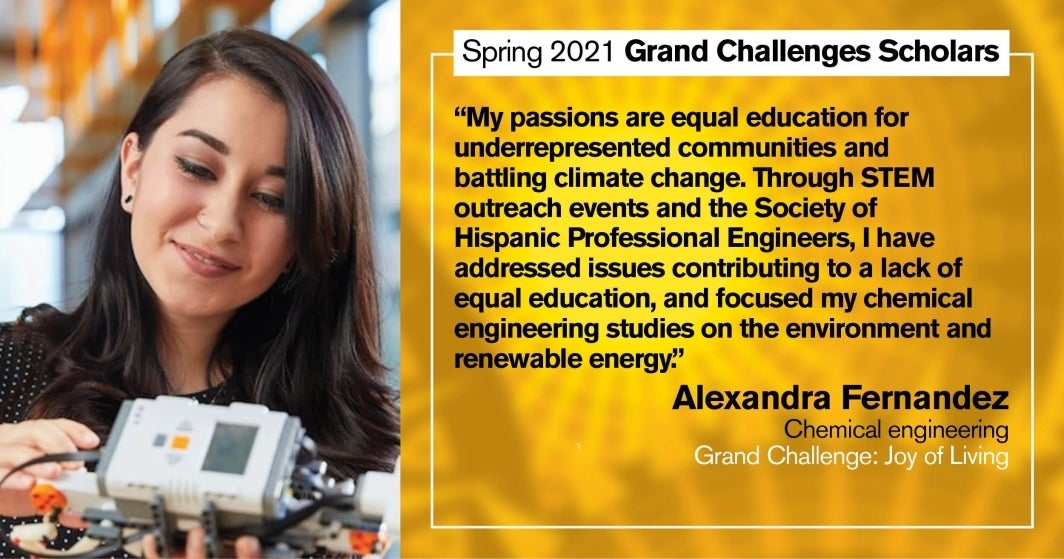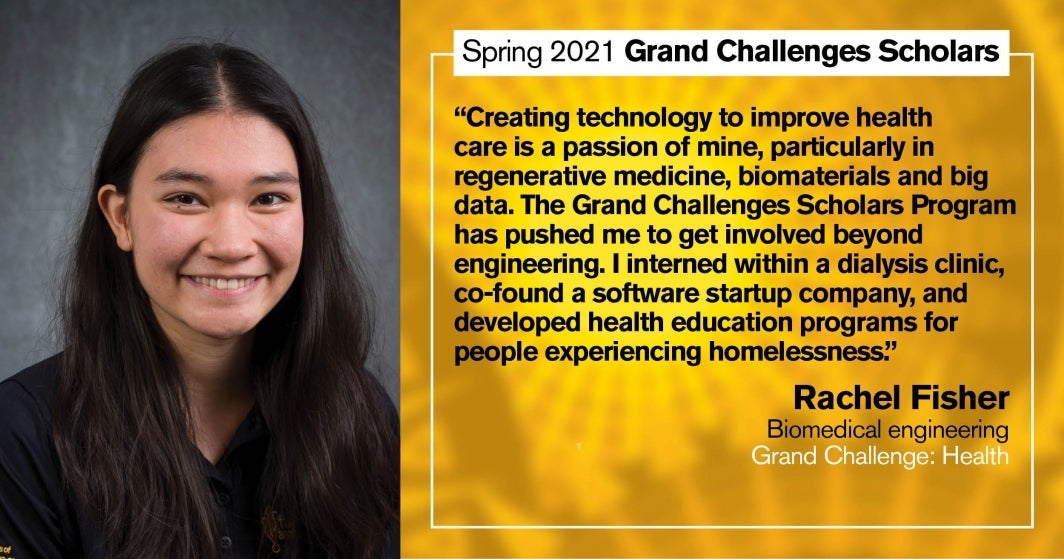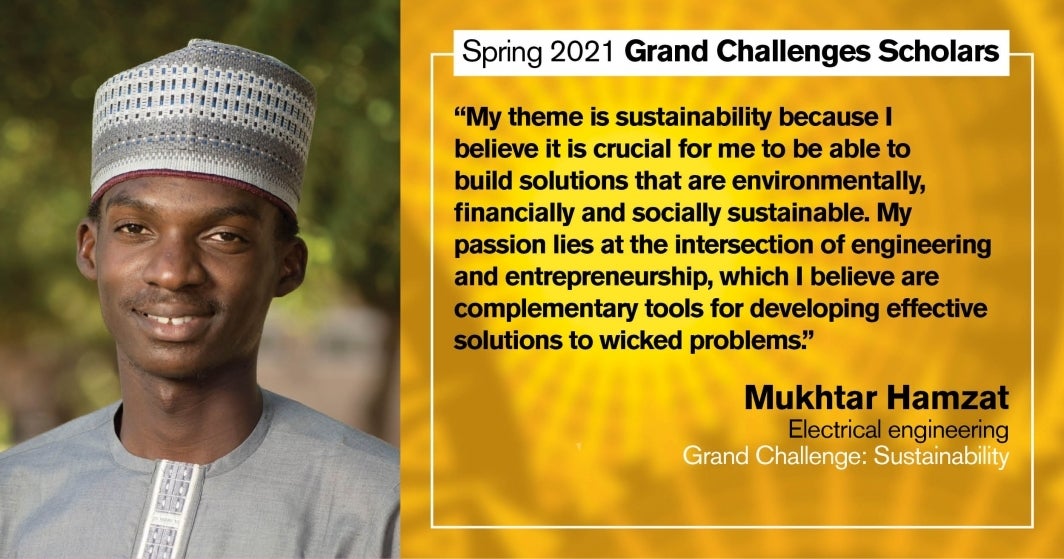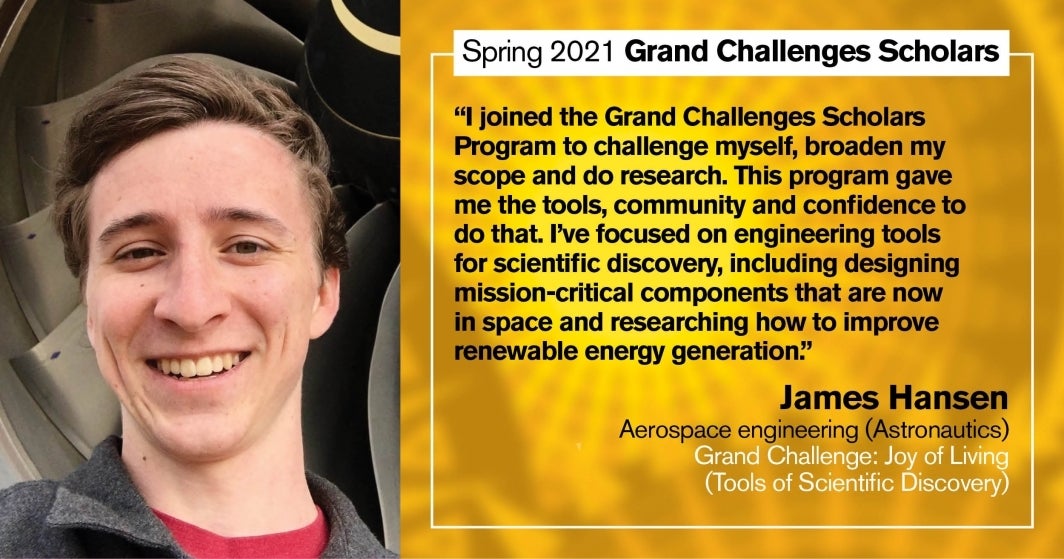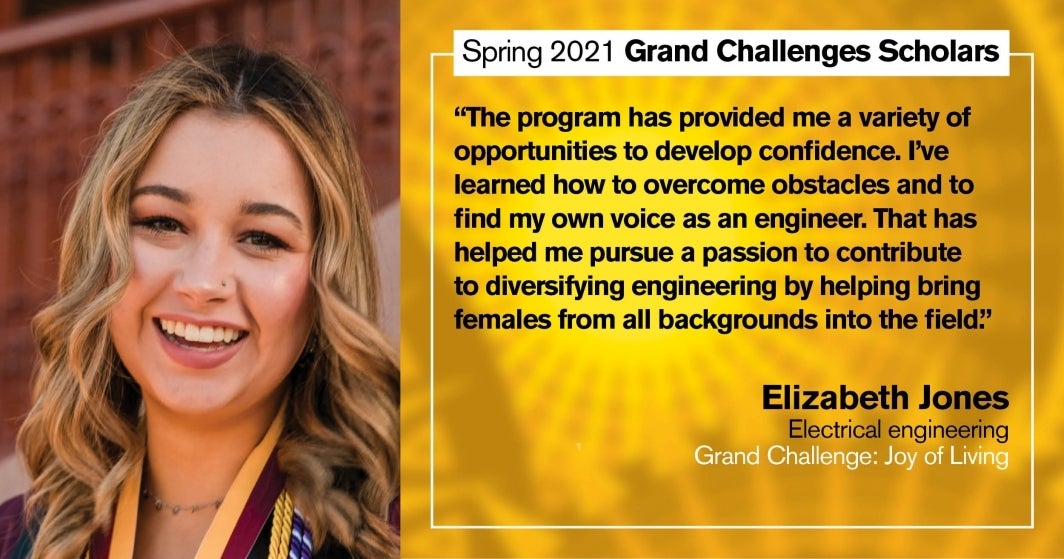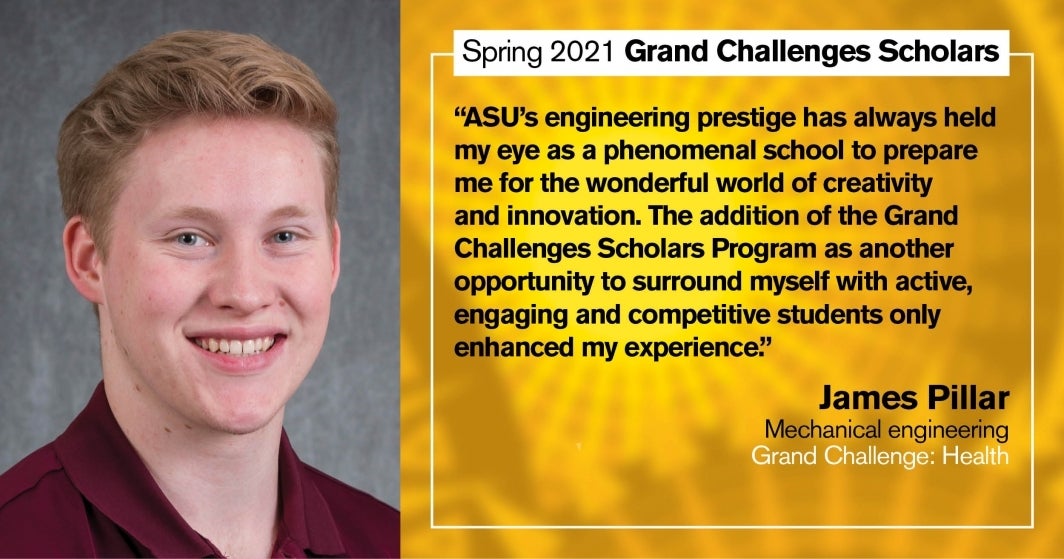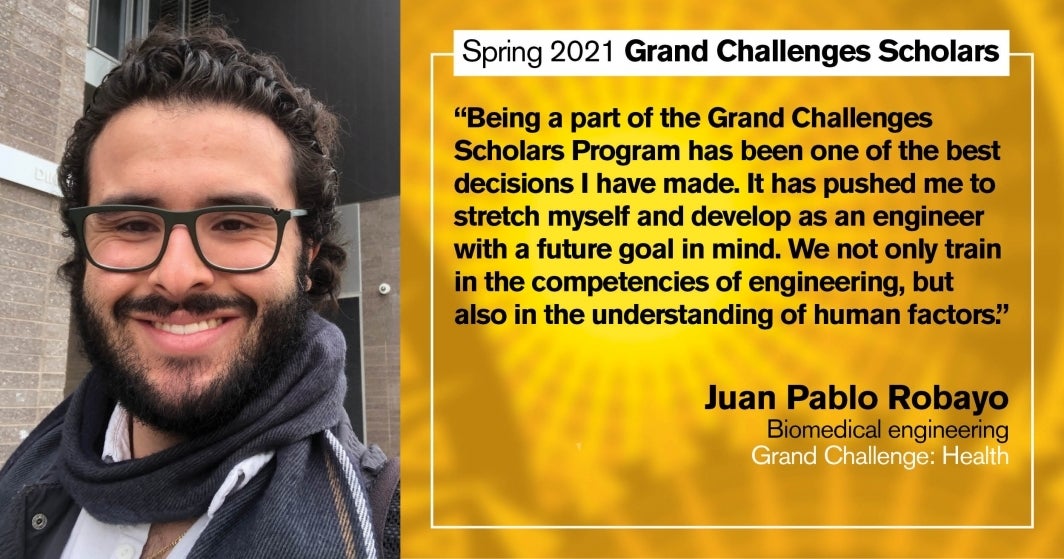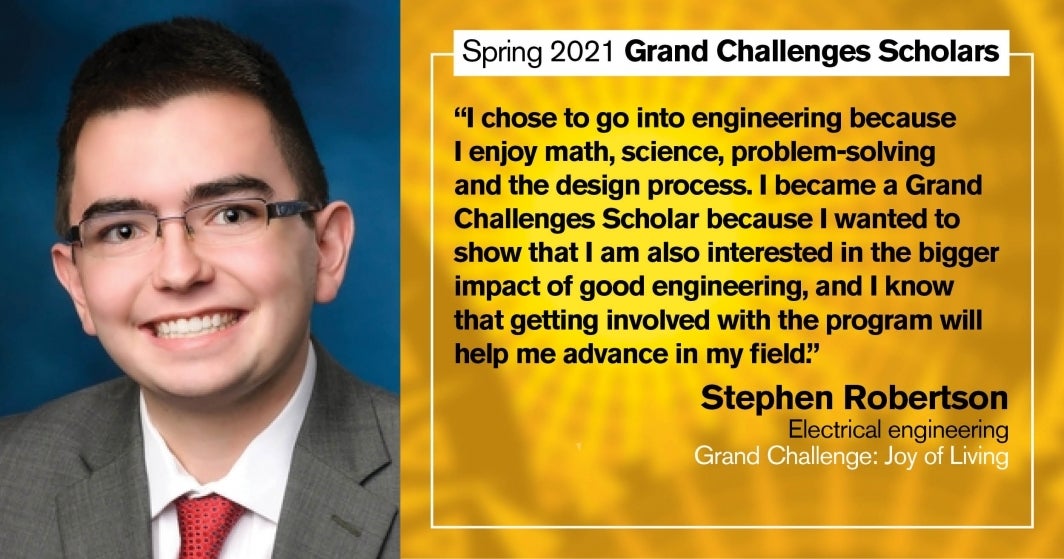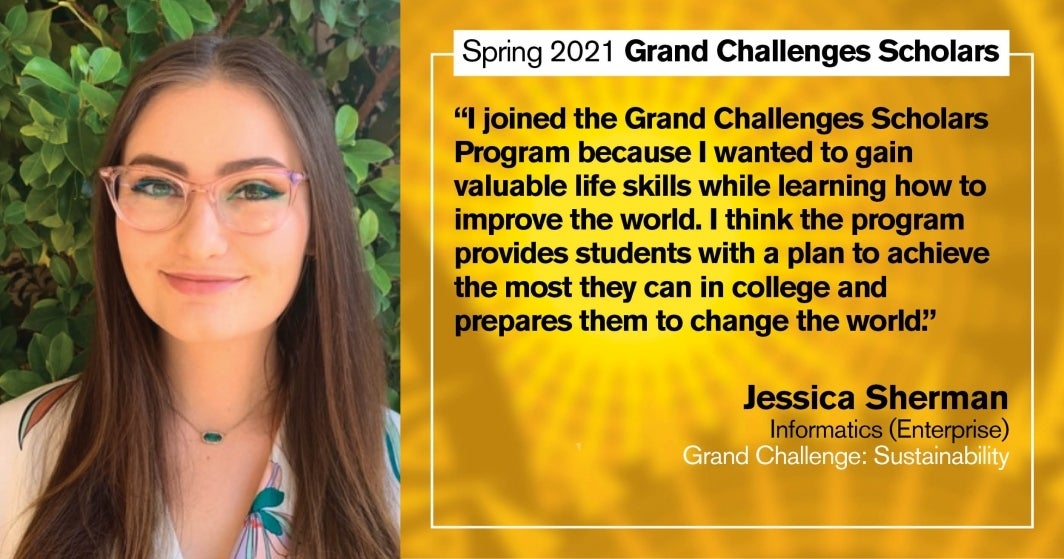14 ASU Grand Challenges Scholars ready to strive for real-world impact
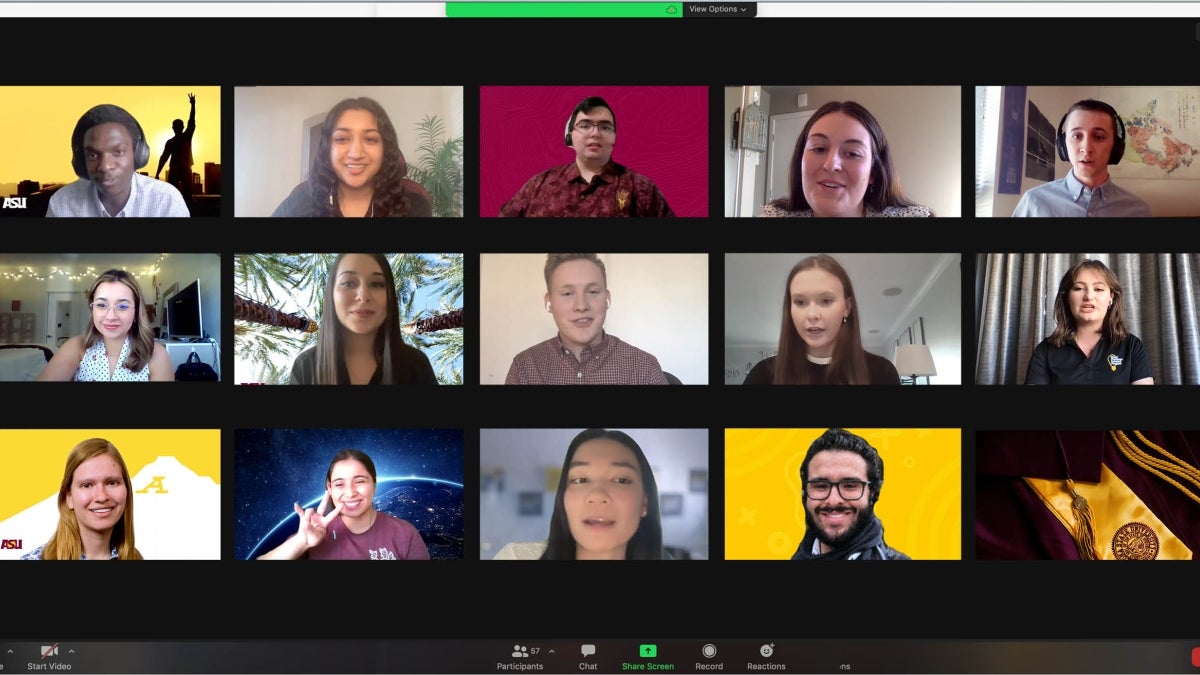
Fulton Schools engineering students in the Grand Challenges Scholars Program must demonstrate competencies in entrepreneurship, multidisciplinary learning, service learning and multicultural experiences. New graduates of the program (from top left to right) are Mukhtar Hamzat, Karishma Albal, Stephen Robertson, McKyla Beuttler, James Hansen, Jessica Sherman, Alexandra Fernandez, James Pillar, Ally Coen, Elizabeth Jones, Claire Block, Cindy Rogel Bahena, Rachel Fisher and Juan Pablo Robayo.
Rachel Fisher says the Grand Challenges Scholars Program enabled her to cultivate the kind of holistic mindset that’s become critical to solving the complex problems confronting engineers in the 21st century.
The program, known as GCSP and offered by the Ira A. Fulton Schools of Engineering at Arizona State University, led Fisher to get involved in research early in her undergraduate studies — she began in her first year. She looks forward to doing more extensive research when she begins her graduate school engineering program in the fall.
Fisher, a biomedical engineering major, also credits the program for strongly encouraging students to learn entrepreneurship skills and to put them into practice. Fisher can now include the accomplishment of co-founding a startup venture on her resume.
She points as well to the leadership and creative abilities she has developed through her experiences in GSCP, a program endorsed by the National Academy of Engineering, or NAE.
Fisher’s growth reflects the progress made by all 14 spring 2021 GCSP graduates, said the program’s Director Amy Trowbridge and Assistant Director Haolin Zhu.
Trowbridge describes the graduates as “one of the most all-in, hands-on, take-charge groups we’ve had” since the program began in 2010.
To earn a place among an international community of NAE Grand Challenges Scholars, students must exhibit competence in entrepreneurship, multidisciplinary learning, service learning, multicultural experience and a creative or research endeavor.
Trowbridge and Zhu characterize this cohort of graduates as exceptionally proactive in their pursuits to meet those standards.
Several members of the group traveled abroad to study and do research, mentored young students, helped lead academic organizations and service projects, and worked as undergraduate teaching assistants or counselors for the GCSP Summer Institute program. Many initiated their own entrepreneurial ventures.
GCSP students choose a focus for their studies in areas that align with the 14 NAE Grand Challenges, which define especially pressing global problems. Students select from among the program’s guiding research themes of health, security, sustainability and joy of living.
The program’s latest ASU graduates “have been dedicated to building the skill sets and mindsets you need to go out and solve these kinds of complex problems,” Trowbridge said.
Electrical engineering student Mukhtar Hamzat was drawn to the program because the education it provides covers his range of interests encompassing engineering, business and public policy from a multicultural perspective.
Karishma Albal, a mechanical engineering student with a concentration in energy and environment, spent a semester studying at the University of New South Wales in Australia.
“I got to work with people from all different backgrounds on projects focusing on areas like energy efficiency and Indigenous studies,” she said.
Her experience there inspired a Fulton Schools Engineering Projects in Community Service, or EPICS, team to design a system to help wildlife survive in the aftermath of the bush fires in Australia.
Albal is also working on a senior year engineering capstone design project to develop freezers that maintain sufficiently low temperatures for storing the Pfizer COVID-19 vaccine.
The freezers also would have a lower carbon footprint than commercially available freezers and serve people in low population areas at lower costs.
Stephen Robertson, an electrical engineering student, helped to start a community-based nonprofit team to provide robotics education for K–12 students on the west side of the Phoenix metropolitan area.
Robertson has also been working with Fulton Schools Professor Michael Kozicki on a food security project to improve how fresh produce is identified and labeled for safe transport.
Electrical engineering student McKyla Beuttler participated in an EPICS project to increase local plastics recycling and then helped turn it into a startup venture.
Cindy Rogel Bahena, a materials science and engineering student, has worked on projects to improve the retention of engineering students, and to make advances in lead-free soldering materials. She has also helped form a startup venture and led community service-learning efforts. Bahena says her most fulfilling experience was serving as president and in other leadership roles with the Society of Hispanic Professional Engineers.
Aerospace engineering student James Hansen focused specifically on the challenge of engineering tools for scientific discovery. That included research through GSCP and the Fulton Undergraduate Research Initiative on ways to increase accessibility to space.
Hansen says that work showed him the importance of taking a holistic view of engineering problems.
“That’s how you understand how problems change because of culture or geography, and how you solve problems in ways that bring people into the equation and make good business sense,” Hansen said.
His research provided insights that aided his efforts in internships with Northrop Grumman Space Systems and the U.S. National Renewable Energy Lab.
Elizabeth Jones, an electrical engineering student, was involved in a range of diverse learning pursuits that provided the focus of her honors thesis on equity in the engineering profession.
The work included studies on how to improve recruitment and retention of engineering students and create an environment in which “engineers are happy and therefore more productive and successful,” Jones said. “GCSP really provided a platform to tie all of those things together.”
Likewise, Alexandra Fernandez, a chemical engineering student, focused in part on removing obstacles to equality in education for underrepresented communities.
Fernandez participated in community outreach through the Society of Hispanic Professional Engineers, and in studying abroad she was able to learn valuable lessons by interacting with “people from all walks of life and from all over the world,” she said.
Those experiences helped to influence her decision “to dedicate my career to helping solve the current climate crisis, the research of renewable energy systems and, more specifically, hydrogen fuel cells,” Fernandez said.
Mechanical engineering student James Pillar benefited from a variety of experiences provided by GCSP that included studying abroad at the National University of Singapore, where he worked in a biomedical robotics laboratory.
While in Singapore, he was also able to explore the diverse local culture, and to volunteer at a sea turtle sanctuary and in elephant conservation efforts.
Pillar says GCSP “inspired a spirit of adventure” that has motivated him to “explore new ways to apply my passion for engineering.”
Biomedical engineering student Ally Coen studied how hospital supply chain operations and industrial engineering strategies can help improve health care and lower costs. She interned for two summers with Medtronic, a global medical company where she will be starting her career in a manufacturing processes position.
Her GCSP experiences, Coen said, “showed me the different types of ways we can approach problems,” giving her confidence in her abilities to succeed in her career.
Projects that reduced food waste and promoted composting were among efforts that bolstered Jessica Sherman’s commitment to helping communities be more sustainable, the informatics student said.
Sherman also completed an internship with the Arizona Public Service utility company that enabled her to author a research paper analyzing the carbon impacts of the electrification of transportation. She also studied abroad in Australia.
“I really like that GCSP pushed me to take my education to the next level,” Sherman said.
Biomedical engineering student Juan Pablo Rabayo got involved in developing assistive medical technologies and studied bioethics and entrepreneurship opportunities related to his field — while minoring in Japanese.
Claire Block, a materials science and engineering student, joined the Next Generation Service Corps, which is part of the ASU Public Service Academy leadership development program.
Block also participated in EPICS and Engineers Without Borders USA, and conducted research abroad in Germany.
Trowbridge said this semester’s graduates form an inspiring portrait of “a community of motivated scholars who are following their passions and mapping their own journeys to change the world as the engineers of the future.”
More Science and technology

ASU professor honored with prestigious award for being a cybersecurity trailblazer
At first, he thought it was a drill.On Sept. 11, 2001, Gail-Joon Ahn sat in a conference room in Fort Meade, Maryland.…

Training stellar students to secure semiconductors
In the wetlands of King’s Bay, Georgia, the sail of a nuclear-powered Trident II Submarine laden with sophisticated computer…
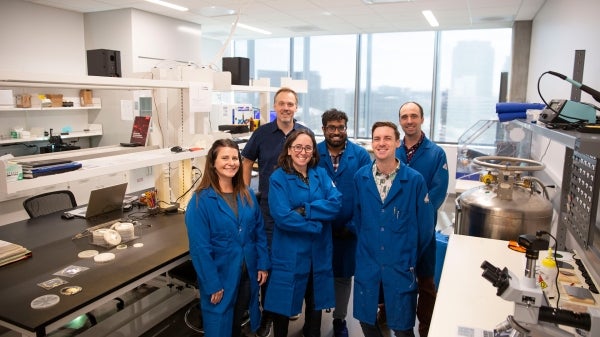
ASU startup Crystal Sonic wins Natcast pitch competition
Crystal Sonic, an Arizona State University startup, won first place and $25,000 at the 2024 Natcast Startup Pitch Competition at…
